Items filtered by date: May 2022
Injuries to the Peroneal Tendons of the Ankle
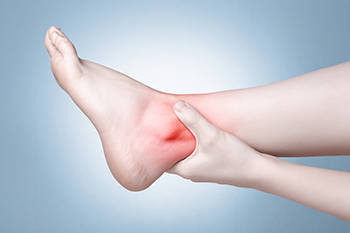
The ankle is a complex structure of bones, muscles, ligaments, and tendons that work together to help you stand, walk, and run. A tendon is a band of tissue that connects muscles to bones. Two peroneal tendons are located on the outer side of the ankle. One connects the bone to the metatarsal on the outside of the foot, and the other runs beneath the foot and connects to the arch. Their job is to stabilize the foot and ankle muscles, helping to prevent strains. Injury to these tendons is common among athletes and people with high arches. The three main categories of peroneal tendon injuries are tendonitis, acute tears, and subluxation. Tendonitis, or inflammation, is most likely the result of repetitive use or overuse that causes pain, swelling, and warmth to the touch. Acute tears are commonly caused by repetitive activity or trauma that results in pain, swelling, and ankle joint instability. Subluxation occurs when the tendon slips out of position, often after an ankle sprain. Symptoms include a snapping feeling in the ankle, along with weakness and instability. If you have injured your ankle, it is suggested you consult a podiatrist as soon as possible for an exam and diagnosis.
Ankle pain can be caused by a number of problems and may be potentially serious. If you have ankle pain, consult with Dr. Ronald Sheppard from Warren-Watchung Podiatry Center. Our doctor will assess your condition and provide you with quality foot and ankle treatment.
Ankle pain is any condition that causes pain in the ankle. Due to the fact that the ankle consists of tendons, muscles, bones, and ligaments, ankle pain can come from a number of different conditions.
Causes
The most common causes of ankle pain include:
- Types of arthritis (rheumatoid, osteoarthritis, and gout)
- Ankle sprains
- Broken ankles
- Achilles tendonitis
- Achilles tendon rupture
- Stress fractures
- Bursitis
- Tarsal tunnel syndrome
- Plantar fasciitis
Symptoms
Symptoms of ankle injury vary based upon the condition. Pain may include general pain and discomfort, swelling, aching, redness, bruising, burning or stabbing sensations, and/or loss of sensation.
Diagnosis
Due to the wide variety of potential causes of ankle pain, podiatrists will utilize a number of different methods to properly diagnose ankle pain. This can include asking for personal and family medical histories and of any recent injuries. Further diagnosis may include sensation tests, a physical examination, and potentially x-rays or other imaging tests.
Treatment
Just as the range of causes varies widely, so do treatments. Some more common treatments are rest, ice packs, keeping pressure off the foot, orthotics and braces, medication for inflammation and pain, and surgery.
If you have any questions, please feel free to contact one of our offices located in Marlboro and Watchung, NJ . We offer the newest diagnostic and treatment technologies for all your foot care needs.
Checking for Scrapes, Cuts, or Bruises on Diabetic Feet
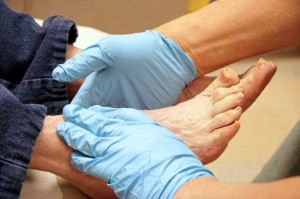
Type 2 diabetes is a serious health condition. It can affect the feet so it is important to check the feet daily for any existing cuts, bruises, or scrapes in order to prevent foot ulcers from developing. Neuropathy can occur with diabetes and it produces a numbing or tingling sensation. This can make it difficult to feel anything on the feet. The diabetic's ability to heal can be diminished and cuts and scrapes can easily become infected. This condition may be controlled by monitoring the blood glucose levels and this can be helped by eating foods that have little or no sugar. It is beneficial to practice proper foot care which includes washing and drying the feet daily and wearing shoes that fit correctly. Additionally, it is helpful to refrain from walking barefoot indoors or outdoors. It is strongly suggested that all diabetic patients be under the care of a podiatrist who can help them properly manage this condition.
Diabetic foot care is important in preventing foot ailments such as ulcers. If you are suffering from diabetes or have any other concerns about your feet, contact Dr. Ronald Sheppard from Warren-Watchung Podiatry Center. Our doctor can provide the care you need to keep you pain-free and on your feet.
Diabetic Foot Care
Diabetes affects millions of people every year. The condition can damage blood vessels in many parts of the body, especially the feet. Because of this, taking care of your feet is essential if you have diabetes, and having a podiatrist help monitor your foot health is highly recommended.
The Importance of Caring for Your Feet
- Routinely inspect your feet for bruises or sores.
- Wear socks that fit your feet comfortably.
- Wear comfortable shoes that provide adequate support.
Patients with diabetes should have their doctor monitor their blood levels, as blood sugar levels play such a huge role in diabetic care. Monitoring these levels on a regular basis is highly advised.
It is always best to inform your healthcare professional of any concerns you may have regarding your feet, especially for diabetic patients. Early treatment and routine foot examinations are keys to maintaining proper health, especially because severe complications can arise if proper treatment is not applied.
If you have any questions please feel free to contact one of our offices located in Marlboro and Watchung, NJ . We offer the newest diagnostic and treatment technologies for all your foot and ankle needs.
Wounds That Don't Heal Need to Be Checked
Working on the Feet While Pregnant
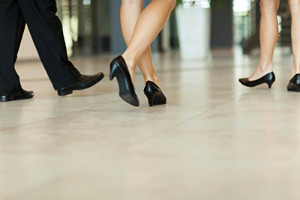
It is beneficial for women who are pregnant to take frequent breaks during the work day. Many jobs require standing or walking for the majority of the time, and foot pain and swelling may develop. It is important to wear shoes that fit well and are comfortable, in addition to practicing simple stretches while standing. Ideal shoes include those with adequate room for the toes to move freely in, and enough cushioning in the heel area. Stress can be taken off the feet by tightening the core muscles. Also, shifting the weight from one foot to the other may help improve blood circulation and reduce swelling. Some pregnant women choose to wear compression stockings, and these can keep circulation normal. It is known that pregnancy can affect the feet because of the added weight that is endured. If you have questions about how to protect the feet while pregnant, please confer with a podiatrist.
While working on the feet, it is important to take the proper care of them. For more information about working on your feet, contact Dr. Ronald Sheppard from Warren-Watchung Podiatry Center. Our doctor will treat your foot and ankle needs.
Working on Your Feet
Standing on your feet for long periods of time can cause stress and pain in your feet. Your whole body may experience change in terms of posture, back pain, bunions, callouses and or plantar warts. There are ways to avoid these conditions with proper foot care, smart choices and correct posture.
Positive Changes
Negative heeled shoe – Choosing this shoe type places the heel slightly lower than the ball of the foot. These are great for overall foot health. Find shoes that fit you correctly.
Go barefoot – Our feet were not designed to be enclosed for all hours of the day. Try to periodically expose your feet to air.
Eliminate Pain
Foot Exercises – Performing simple exercises, incorporating yoga and doing stretches are beneficial. This will allow increased blood flow to the area and muscles of the foot.
Achilles tendon – Stretching the foot out flat on the floor will relax the calf muscles and tendon. These exercises can be performed almost anywhere. Make sure you add these exercises to your daily regimen.
With a little bit of this information and knowing more about foot health, you will notice changes. Foot stretches and proper footwear will help with pain and prevent further issues.
If you have any questions please feel free to contact one of our offices located in Marlboro and Watchung, NJ . We offer the newest diagnostic and treatment technologies for all your foot and ankle needs.
Everyday Foot Care May Help to Prevent Foot Conditions
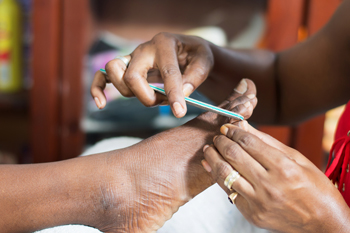
Many people worldwide tend to neglect their feet. There are simple practices for everyday foot care that can provide comfort, softer skin, and a general feeling of wellbeing. These can include moisturizing frequently, wearing shoes that fit correctly, and trimming the toenails properly. There are specific foot conditions that may be prevented when the feet are properly taken care of. Athlete’s foot can possibly be avoided when appropriate shoes are worn in public areas. Bunions are less likely to develop when shoes that fit correctly are worn. A blister can cause discomfort, and generally forms as a result of excess friction that can come from shoes and socks that are too tight. Some people find it relaxing and soothing to pamper their feet in warm water, followed by having a foot massage. If you would like additional information about effective foot care techniques, please consult with a podiatrist.
Everyday foot care is very important to prevent infection and other foot ailments. If you need your feet checked, contact Dr. Ronald Sheppard from Warren-Watchung Podiatry Center. Our doctor can provide the care you need to keep you pain-free and on your feet.
Everyday Foot Care
Often, people take care of their bodies, face and hair more so than they do for their feet. But the feet are a very important aspect of our bodies, and one that we should pay more attention to. Without our feet, we would not be able to perform most daily tasks.
It is best to check your feet regularly to make sure there are no new bruises or cuts that you may not have noticed before. For dry feet, moisturizer can easily be a remedy and can be applied as often as necessary to the affected areas. Wearing shoes that fit well can also help you maintain good foot health, as well as making it easier to walk and do daily activities without the stress or pain of ill-fitting shoes, high heels, or even flip flops. Wearing clean socks with closed shoes is important to ensure that sweat and bacteria do not accumulate within the shoe. Clean socks help to prevent Athlete’s foot, fungi problems, bad odors, and can absorb sweat.
If you have any questions please feel free to contact one of our offices located in Marlboro and Watchung, NJ . We offer the newest diagnostic and treatment technologies for all your foot and ankle needs.
Metatarsus in Your Child
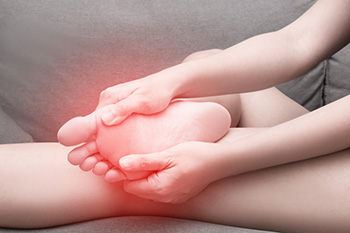
Some children are born with a condition known as metatarsus adductus, which is a turning inward of the feet. The inside of the foot appears caved in and the outside more rounded. While it may be alarming to look at, this condition generally diminishes in a few years. Although no cause has been determined for metatarsus adductus, some experts believe it to be a result of the fetus being tightly packed inside the uterus before birth. The metatarsus is a collection of bones in the midfoot, known as the five metatarsals. These bones connect the toes to the heel. A podiatrist can properly examine your baby’s feet and determine which form of metatarsus is present. In flexible metatarsus, the foot can be straightened manually, and some stretching exercises may help. The condition may continue until the child is between 1 and 2 years old. In non-flexible metatarsus, the foot stays in a curved position. In this case, fittings for braces and special shoes may be required. In rare cases, surgery to reposition the foot may be suggested. A podiatrist can monitor your child’s case and prescribe appropriate treatment.
The health of a child’s feet is vital to their overall well-being. If you have any questions regarding foot health, contact Dr. Ronald Sheppard of Warren-Watchung Podiatry Center. Our doctor can provide the care you need to keep you pain-free and on your feet.
Tips for Keeping Children's Feet Healthy
- Make sure their shoes fit properly
- Look for any signs of in-toeing or out-toeing
- Check to see if they have Clubfoot (condition that affects your child’s foot and ankle, twisting the heel and toes inward) which is one of the most common nonmajor birth defects.
- Lightly cover your baby’s feet (Tight covers may keep your baby from moving their feet freely, and could prevent normal development)
- Allow your toddler to go shoeless (Shoes can be restricting for a young child’s foot)
- Cut toenails straight across to avoid ingrown toenails
- Keep your child’s foot clean and dry
- Cover cuts and scrapes. Wash any scratches with soap and water and cover them with a bandage until they’ve healed.
If you have any questions, please feel free to contact one of our offices located in Marlboro and Watchung, NJ . We offer the newest diagnostic and treatment technologies for all your foot care needs.

